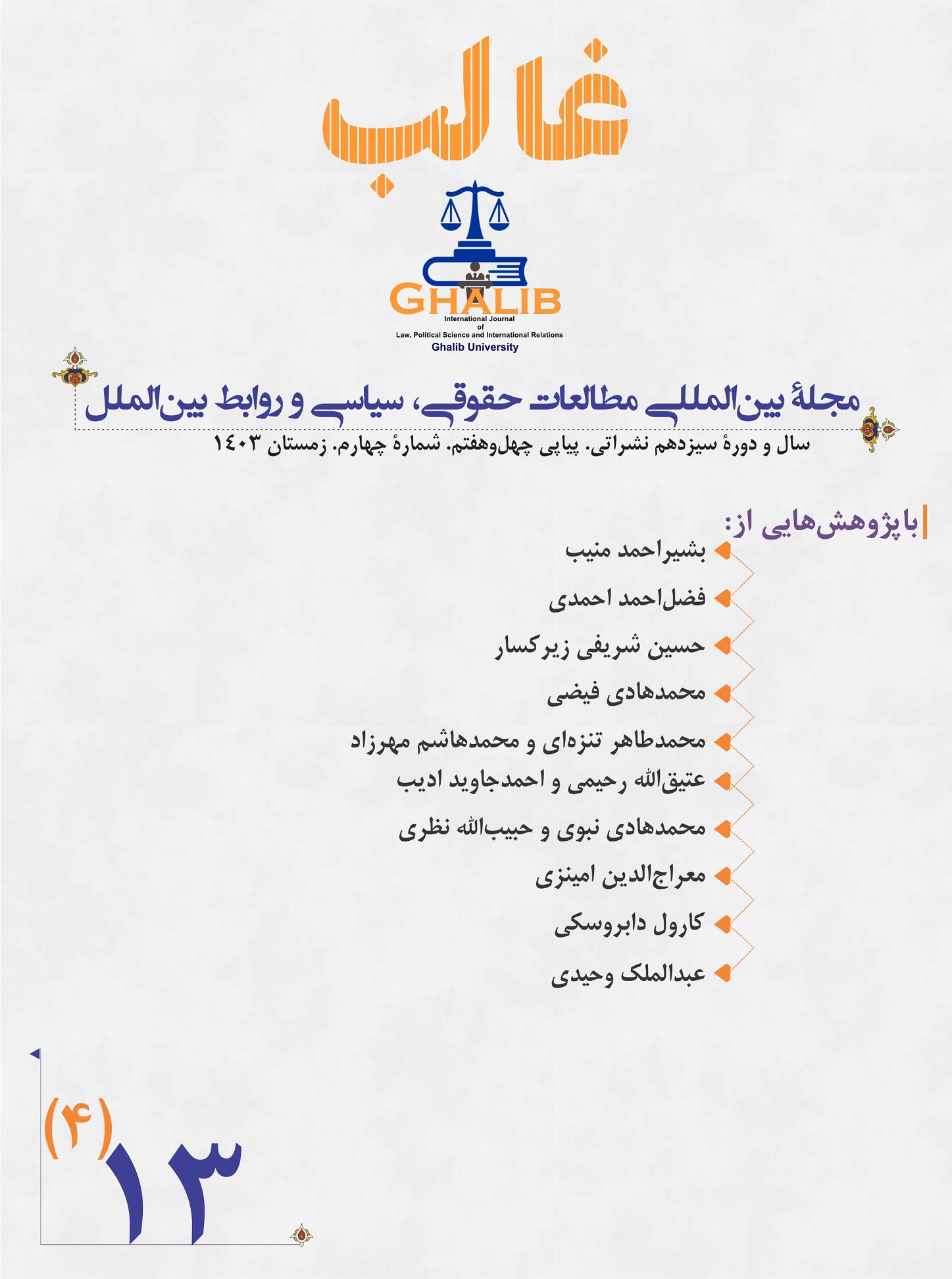Cultural Development: A way to reduce violence against women in Afghanistan
DOI:
https://doi.org/10.58342/ghalibqj.V.13.I.4.10Keywords:
Women, Violence, Criminal Policy, Cultural Development, Civil Rights, AfghanistanAbstract
A large part of the factors behind the spread of violence against women in Afghanistan is cultural. Because culture is a guiding norm that affects various parts of human individual and social life. The question is what is the role of Cultural development in reducing violence against women? The answer to this question seems important. The present article, conducted using an analytical-descriptive method and library resources, has attempted to answer the above question of reducing violence against women. The research findings show that cultural development leads to society's intellectual growth and enhances individuals' capacity, especially women, in risky situations. Efforts to develop a culture related to women, such as educating women exposed to violence, establishing a center for statistics/statistics of victims of violence, creating a safe space for affected and injured individuals, cooperation between health and security institutions in reporting crimes and recording violent incidents, compensating women victims of violence, and providing counseling services to victims of violence, increase women's self-confidence and improve their ability to provide appropriate responses to criminal phenomena. As a result, cultural growth, and growth-oriented prevention of violence against women are realized, and women are freed from being targets of crime.
References
اعزازی، شهلا. (1380). خشونت خانوادهگی، زنان کتکخورده. تهران: نشر سالی.
داوري اردكاني، رضا. (1374). «چگونه ميتوان با تلویزيون كنار آمد». نامۀ فرهنگ. 3(5). http://ensani.ir/fa/article/22909/%DA%86%DA%AF%D9%88%D9%86%D9%87-%D9%85%DB%8C-%D8%AA%D9%88%D8%A7%D9%86-%D8%A8%D8%A7-%D8%AA%D9%84%D9%88%D8%B2%DB%8C%D9%88%D9%86-%DA%A9%D9%86%D8%A7%D8%B1-%D8%A2%D9%85%D8%AF
راجردی، ویمر؛ جوزف آر. دومینیک. (1396). تحقيق در رسانه¬های جمعي. ترجمۀ كاووس سيد امامي. چ دوم. تهران: انتشارات سروش.
رایجیان اصلی، مهرداد. (1384). «بزهدیدهشناسی حمایتی در پرتو اعلامیة اصول بنیادی عدالت برای بزهدیدگان و قربانیان سوءاستفاده از قدرت». پژوهشهای حقوقی. 4(7). 29-53. https://jlr.sdil.ac.ir/article_44547.html
رایجیان اصلی، مهرداد. (1398). بزه¬دیدهشناسی. ج دوم. چ دوم. تهران: شهر دانش.
رزاقي، سهراب. (1378). نوسازي و توسعة سياسي در ايران و منتقدان آن. در مجموعة مشارکت سياسي؛ احزاب و انتخابات. تهران: نشر سفير.
رضوانی، سودابه؛ مهدویپور، اعظم؛ منیب، عبدالمتین. (1399). «خشونت جنسیِ علیه زنان در نظام تقنینیِ ایران و افغانستان؛ از به ستوهآوری جنسی تا تجاوز». فصلنامة تحقیقات حقوقی. 23(91). 351-376. https://lawresearchmagazine.sbu.ac.ir/article_87520.html
شیلر، هربرت آی. (1377). وسایل ارتباط جمعی و امپراطوری آمریکا. ترجمۀ احمد عابدینی. تهران: انتشارات سروش.
صاحبی، محمدجواد. (1384). مناسبات دین و فرهنگ در جامعۀ ایران. چ دوم. تهران: انتشارات وزارت فرهنگ و ارشاد اسلامی.
عبدالله، محمد قاسم؛ علیوی، موح اراک. (1443). «العنف ضد المرأة العوامل والاثار». مجلة الآداب. 3(141). 423-436. https://doi.org/10.31973/aj.v3i141.3743
عظیم¬زاده، شادی و هم¬کاران. (1401). «رؤیارویی با پایداری بزهکاری در سایۀ بایسته¬های جرمشناسی رشدمدار». تحقیقات حقوق خصوصی و کیفری. (54). 83 – 108. http://noo.rs/FX8Q0
علوي، سيدمحمدرضا. (1388). «حديث ركن چهارم؛ سیر مطبوعات در افغانستان». مجلۀ طرح نو. 4(16و17). [مجلة چاپی].
قانون رسانههای همهگانی افغانستان، مصوب 1388 ش.
قانون منع خشونت عله زنان، مصوب ۱۳۹۲ش.
کنوانسیون منع خشونت علیه زنان، مصوب ۱۹۹۳م.
https://arabstates.unwomen.org/ar/what-we-do/ending-violence-against-women/faqs/types-of-violence
مسعودنیا، حسین. (1384). «جامعة مدنی و نهادهای غیردولتی در ایران». نشریه علوم اداری و اقتصاد -(37)، 0-0. https://sid.ir/paper/486625/fa
نجفی ابرندآبادی، علی حسین. (1378). «پیشگیری از بزهکاری و پلیس محلی». فصلنامة تحقیقات حقوقی. 2(شماره 25-26). 129-149. https://lawresearchmagazine.sbu.ac.ir/article_56889.html
نورمحمدی، معصومه سادات. (1390). سیاست جنایی افغانستان در قبال زنان بزهدیده. تهران: نشر میزان.
Ayesha Qaisrani, Sadaf Liaquat and Elishma Noel Khokhar (2016) .Socio-economic and Cultural Factors of of Violence against Women in Pakistan. Pakistan: SDPI.
References
Ezazi, Shahla. (2001). Domestic Violence: Battered Women. Tehran: Nashr-e Salis. [In Persian]
Davari Ardakani, Reza. (1995). "How to Cope with Television." Nameh-ye Farhang, 3(5). [In Persian]
Rajarji, Wimmer; Joseph R. Dominick. (2017). Research in Mass Media. Translated by Kavous Seyed Emami. 2nd Edition. Tehran: Soroush Publications. [In Persian]
Rayejian Asli, Mehrdad. (2005). "Supportive Victimology in Light of the Declaration of Basic Principles of Justice for Victims of Crime and Abuse of Power." Legal Researches, 4(7), 29-53. [In Persian]
[Link: https://jlr.sdil.ac.ir/article_44547.html]
Rayejian Asli, Mehrdad. (2019). Victimology. Vol. 2, 2nd Edition. Tehran: Shahr-e Danesh. [In Persian]
Razaghi, Sohrab. (1999). Modernization and Political Development in Iran and Its Critics. In Political Participation: Parties and Elections. Tehran: Safir Publications. [In Persian]
Rezvani, Soudabeh; Mahdavipour, Azam; Munib, Abdul Mateen. (2020). "Sexual Violence Against Women in the Legislative Systems of Iran and Afghanistan: From Sexual Harassment to Rape." Quarterly Journal of Legal Research, 23(91), 351-376. [In Persian]
[Link: https://lawresearchmagazine.sbu.ac.ir/article_87520.html]
Schiller, Herbert I. (1998). Mass Media and American Empire. Translated by Ahmad Abedini. Tehran: Soroush Publications. [In Persian]
Sahebi, Mohammad Javad. (2005). Relations Between Religion and Culture in Iranian Society. 2nd Edition. Tehran: Ministry of Culture and Islamic Guidance Publications. [In Persian]
Abdullah, Mohammed Qasim; Alawi, Moha Araak. (2022). "Violence Against Women: Factors and Effects." Adab Journal, 3(141), 423-436. [In Arabic]
[Link: https://doi.org/10.31973/aj.v3i141.3743]
Azimzadeh, Shadi, et al. (2022). "Confronting Persistent Delinquency Under the Shadow of Developmental Criminology Requirements." Private and Criminal Law Researches, (54), 83-108. [In Persian]
[Link: http://noo.rs/FX8Q0]
Alavi, Seyyed Mohammad Reza. (2009). "The Fourth Pillar Narrative: A Journey Through the Press in Afghanistan." Tarh-e Now Journal, 4(16-17). [Print Journal] [In Persian]
Mass Media Law of Afghanistan, Adopted 2009. [In Persian]
The Law on the Elimination of Violence Against Women, Adopted 2013. [In Persian]
Convention on the Elimination of Violence Against Women, Adopted 1993. [In English]
[Link: https://arabstates.unwomen.org/ar/what-we-do/ending-violence-against-women/faqs/types-of-violence]
Masoudnia, Hossein. (2005). "Civil Society and NGOs in Iran." Journal of Administrative and Economic Sciences, (37), 0-0. [In Persian]
[Link: https://sid.ir/paper/486625/fa]
Najafi Abrandeh Abadi, Ali Hossein. (1999). "Crime Prevention and Local Police." Quarterly Journal of Legal Research, 2(25-26), 129-149. [In Persian]
[Link: https://lawresearchmagazine.sbu.ac.ir/article_56889.html]
Noor Mohammadi, Masoumeh Sadat. (2011). Criminal Policy of Afghanistan Towards Female Victims. Tehran: Mizan Publications. [In Persian]
Ayesha Qaisrani, Sadaf Liaquat and Elishma Noel Khokhar (2016) .Socio-economic and Cultural Factors of of Violence against Women in Pakistan. Pakistan: SDPI.














